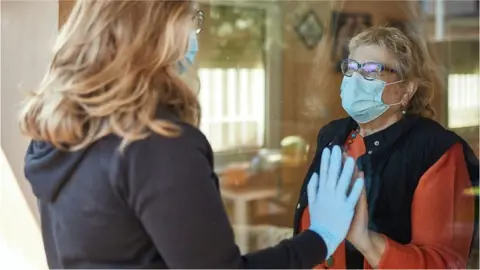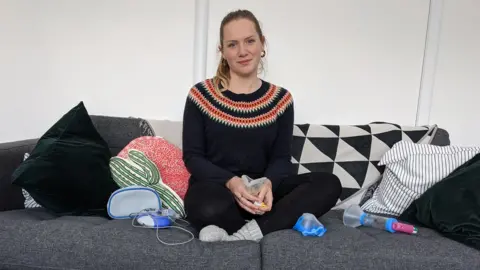Covid: Shielding alone 'felt like slippery slope to grave'
 Getty Images
Getty ImagesShielding alone earlier in the Covid pandemic felt like "a slippery slope to the grave" for 60-year-old Margaret.
New figures show that, of the 121,000 households shielding in Wales in July, more than half consisted of one person living alone like her.
Age Cymru said older people had endured a particularly hard time and a "concerted effort" was needed to ensure support was in place for the winter.
The Welsh Government has been asked to comment.
From the start of the pandemic to 16 August, tens of thousands of people in Wales with underlying health conditions were advised to stay indoors to protect themselves.
And while Wales is set to exit a 17-day "firebreak" lockdown on Monday, many vulnerable people will continue to isolate or take extra care in order to avoid contracting Covid-19.
'I felt excluded'
As people began to return to normal after the first lockdown, Margaret, from Pembrokeshire, was left feeling more shut out than ever.
She initially started shielding because she had lupus - a long-term autoimmune condition that causes joint pain, skin rashes and tiredness which can lead to the breakdown of cells.
"Some of the community spirit dropped away as people went back to their normal lives after the first lockdown ended. I felt excluded then," she said.
"Sometimes on social media, or out on a walk, I would see that people I knew had been somewhere together and I hadn't been invited.
"They would say things like, 'we know you like to keep away from people' - which is not true, but I suppose they thought I was excluding myself."
She has not seen her son for more than a year and worries the young children in the family will not remember her.
"I feel as though I have been in limbo for a year. I was 60 at the end of 2019 and planned to have a year of celebration with road trips to see my family and a summer party," she said.
"Sixty is not old but staying at home all the time on my own, talking to myself and not going out, especially as the winter is coming on, feels like a slippery slope to the grave."

Margaret said she felt there was even negativity among some people who believed those isolating after the shielding had paused were causing an impact on the economy.
Age Cymru's chief executive Victoria Lloyd said many older people were already suffering with loneliness and isolation before, but the pandemic had "compounded the situation".
"With winter coming we need a concerted effort to make sure that we have the right systems and support in place for older people, particularly those who may find themselves shielding for a period of time."
She said protected shopping slots, prescription deliveries and full access to health and social care were all issues that need to be resolved if there were further lockdowns.
"We would also urge local communities to continue to look after their older families and neighbours by keeping in touch with them and offering support and reassurance during difficult times," she added.
"We very much welcomed the support of volunteers during the first lockdown."
What is the current advice on shielding?
Shielding guidance has not changed since it was paused on 16 August, despite the rise in coronavirus cases since the autumn.
The Welsh Government has said it did not want those most at risk to go back to measures expected of them earlier in the summer because of the potential negative effects on people's mental health.
The chief medical officer for Wales wrote to those on the shielding patients list to say "you do not need to restart shielding but you should take extra care".
This means people should follow the same rules as everyone else, but take extra care in regularly washing hands, keeping contacts to a minimum and shopping online.
'Shielding is really lonely'
Welsh Government data shows there were about 44,000 more people above 50 shielding than 18 to 29-year-olds.
But Lucy Dixon, from Newcastle Emlyn in Carmarthenshire, said she too felt the impact of loneliness when shielding alone.
The 28-year-old said: "I'm really sociable, so it's really lonely.
"I said to myself all along that this [coronavirus] is at least for the next year, if not a couple of years.
"I told myself that because I thought if I set myself up to believe that it would be shorter than that, I would be really upset and disappointed."
 Lucy Dixon
Lucy Dixon Ms Dixon has Primary Ciliary Dyskinesia (PCD), a rare disease which often leads to permanent lung damage, which means she is "clinically extremely vulnerable" and was advised to shield by the government.
She has chosen to continue shielding alone due to the seriousness of her condition.
But she started shielding at her parents' home in mid-March before she received any guidance.
"My parents put a bookcase in this archway that leads from one room to another, so I was fortunate to have a self-contained space," she said.
"It was tough. I cooked for the first couple of months on an electric, portable hob - it was just pasta and rice - and we ended up getting government food boxes for a while because it was so hard to get delivery slots."
Despite being on the other side of the wall from her parents, the only time Ms Dixon saw them for the first couple of months was through a window, until the weather got better.
She said she wasn't working at the time, because of her health, so "all I was doing was just reading these horrific stories thinking 'I'm going to die if I get this'".
"I don't feel like that now, but I did at the time," Ms Dixon said.
She added she is taking things day-by-day and making the most of her "new life" for now.
